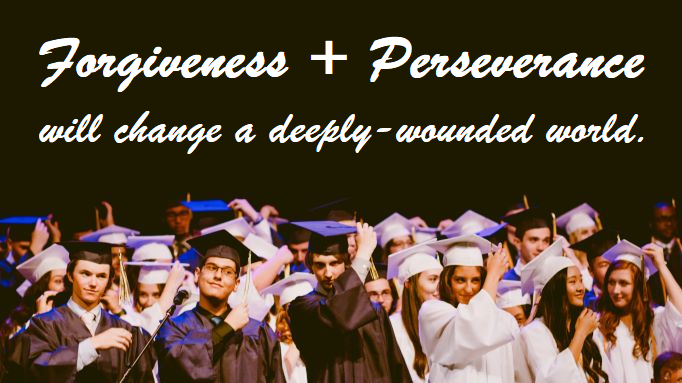Tagged: “Perseverance”
The eleventh of 15 criticisms that I so characteristically see on-line is this: The self-help advice suggests that forgiving is a quick-fix, accomplished so quickly as to be a superficial and misguided way of healing from trauma.
Research consistently shows that to forgive a person for a very deep injustice that has resulted in the effects of trauma takes patience, struggle, and time. This science shows that to forgive a person for such deep injustices is definitely not a quick fix. The problem here is in the advice of quickness and not something inherent in forgiveness itself.
A Tribute to Our Director
For those of you who have read the International Forgiveness Institute’s newsletters, news items, blogs, and other features on our website, you have our long-time Director, Dennis Blang, to thank for that. He has tirelessly shown a love for the moral virtue of forgiveness. He has long shown the moral virtue of perseverance as he has worked to constantly improve the website for the sake of those who want to know more about forgiveness and to make a better world.
It was Mr. Blang who contracted with web developers to constantly improve the site. Over the years he added the Research page, the forgiveness curriculum page, the videos from three different international conferences, the research scales page with free forgiveness instruments for all who are interested, and much more. There are close to 3,000 entries in what is the most comprehensive forgiveness website in the virtual world. For his efforts, this website was awarded The Best Websites of 2022 by The Good Estate, a multi-thematic review website where users can find high quality information about all kinds of digital and physical products. TheGoodEstate is a project of Global Commerce Media.
forgiveness curriculum page, the videos from three different international conferences, the research scales page with free forgiveness instruments for all who are interested, and much more. There are close to 3,000 entries in what is the most comprehensive forgiveness website in the virtual world. For his efforts, this website was awarded The Best Websites of 2022 by The Good Estate, a multi-thematic review website where users can find high quality information about all kinds of digital and physical products. TheGoodEstate is a project of Global Commerce Media.
It was Mr. Blang who oversaw the development of our online education course, Forgiveness Therapy, and encouraged students as they moved forward in the book. I always was so impressed with the care he would take with each student, answering questions and clarifying correct answers when a student would inquire about the right answer.
I have been amazed at his breadth of knowledge about the state-of-the-art in the world regarding forgiveness. He frequently would pass news items and journal articles my way, asking if I had seen them. In the vast majority of cases, these were hidden gems worthy of our time and he was the first to find them, write about them, and then post information on them for you, the readers.
His care for the donors, who so wonderfully support the spread of forgiveness across the world, shows his love for forgiveness and his deep respect and appreciation for those who give of their own provisions for good. His emails to them always are sincere, supportive, and special.
His care for those who have taken the time to write to us is equally noteworthy. Those emails come to us from all over the world. Some people write in because they are hurting and need care. Mr. Blang has taken the time to care for them as he has suggested resources and professionals who can aid each one in their healing. He has treated each person as special, unique, and irreplaceable, giving the time and attention that each one needs. Only someone who has a love for forgiveness and a love for hurting people could sustain such an effort. Thank you for your caring, Mr. Blang.
Dennis Blang has been a gift to the world of forgiveness and for that I am deeply grateful. He now will be retiring, opening up new chapters in his life with his wife, Carol. We at the International Forgiveness Institute want to thank Mr. Blang for being a champion of forgiveness. Without him, we would not be as far down the road of forgiveness as we are now. Thank you so very much, Mr. Blang. Your work has been invaluable and we appreciate you perhaps even more than you realize.
![]()
You talk about forgiveness as a process, one that can take time. I find that as I go along the path of forgiveness, that I slip into revenge-seeking. I do not mean anything violent, just some nastiness or even verbal disrespect. Do you think this will delay my forgiveness process?
We are all imperfect forgivers and so we cannot think of forgiveness as a straight line from the start to the finish. We go back and forth with forgiveness. At times, we see the one who offended us as possessing inherent worth. Then we might have a dream about the person and we wake up angry and do not want to even think about the person. The key here is to understand that the process is not a straight line. Have patience with yourself. Try to have patience with the one whom you are forgiving. In time, this back-and-forth will even out and improvements in forgiving are likely as you continue to persevere in the forgiveness process.
Perseverance as the Missing Piece to Family, School, and Community Forgiveness
Having studied the psychology of forgiveness since 1985 and having helped plant forgiveness education in schools since 2002, I have come to realize that there is another moral virtue that needs to exist alongside forgiving if forgiveness is to mature in minds, hearts, and groups. That virtue is perseverance, or the willed decision and action to keep going despite challenges and to not get distracted by other issues. In the ethical treatise, Virtues and Vices (attributed to Aristotle, but possibly written by one of his followers), the virtue of perseverance or endurance is said to exist alongside the virtue of courage and daring. I would add that perseverance will be a moral virtue as long as it is connected to both wisdom and justice (as well as courage) because it is good only if the goal to which people are dedicating a good part of their lives is fair and reasonable. Persevering in bank robbery, for example, is vice not virtuous.
Perseverance is rarely discussed in modern society as we play with our gadgets and move from one forum to another. This kind of quick movement is part of what the 17th century French philosopher, Blaise Pascal, in his masterful work, Pensées, refers to as diversion. He challenged readers by saying that most people cannot endure even one hour alone in their own room without seeking new diversions. If this was the case over four centuries ago, how much more might diversion be weakening our ability to engage in the moral virtue of perseverance now?

In an earlier blog, I related an interaction with Mr. Brian McParland of St. Vincent de Paul Primary School in Belfast, Northern Ireland in the fall semester of 2002. Upon approving forgiveness education in his school, he told me that I would last only 3 years at this task because that is all the time anyone ever seems to give to new classroom initiatives. In other words, people do not persevere. I have seen the same in local groups that start forgiveness education programs with adults only to have them fade over time. Yet, as Aristotle reminds us, and challenges us, it takes time to grow deeply in the moral virtues. We do not become proficient in any moral virtue by giving it a try for a little while any more than we become physically fit by hitting the gym for a month and then going back to the couch and the potato chips. It takes time and effort to become forgivingly fit. It takes time to grow in the moral virtue of perseverance.
So, it seems to me that the first step in growing intra-personally in forgiveness, in aiding families and schools and local community organizations to grow in forgiveness is to openly and boldly and persistently discuss perseverance and the serious challenge all people face as they say, “Let’s hit the forgiveness gym!” Without perseverance, we lose our forgiving fitness very soon.
How much perseverance do we need to change the world? It seems to me that we need to introduce students to forgiveness, without forcing them to forgive, from age 4 to age 18. It seems to me that we need two generations, about 40 years, of forgiveness in communities to change those communities and to change community-to-community conflicts, even brutal conflicts that seem at present to have no end in sight. Forty years? Forty years when there will be new distractions, new shiny diversions? Yes, and it is the teamwork of forgiveness and perseverance, and leaders who will take over for other leaders, that will win in the peace movement. This combination of forgiveness and perseverance never has been tried anywhere in the world at any time in human history. It is time.
With perseverance, we might just be able to bring forgiveness for good to a deeply wounded world. Long live perseverance! Long live forgiveness!
![]()
Speed and Forgiveness
I will try to be brief.
Speed. You can see it in the driving as the very rare few people actually adhere to the posted speed limit these days.
Speed. You can see it as you watch people walking on the street, phone in hand, scrolling, scrolling, scrolling. I wonder how long the average person stays on one topic within that phone.
Speed. Have you noticed the new trend on Facebook?: reels. These are, what?, maybe 10 seconds each? 10 seconds to view a video…….
Speed. Have you seen those commercials on the Internet, promising you weight loss at night as you sleep if you take a certain kind of pill? At night? With no exercise? And immediate results?
Speed. I have seen such statements as, “Forgive in 6 easy steps.”
Speed. It is in contradiction to what it means to grow as a person. To grow as a person is to slowly improve in the virtues, first identified by Plato as justice, or giving your best with your gifted qualities so that the community is better off and in harmony with others. This takes time to develop your gifted qualities. Forgiveness, as a moral virtue, is crafted with three things: practice, practice, practice. It takes effort and time and struggle to be good to those who are not good to you. It even takes time to deeply understand what forgiveness is and what it is not so that you do not confuse it with excusing wrongdoing or automatically reconciling or throwing justice under the bus. There is no such thing as the forgiveness pill that will reduce resentment as you sleep.
Speed and forgiveness. I have come to realize that they are not compatible and so I am concerned about the new norms of speed, shifting focus quickly, and a lack of required attention. The new norms may be getting in the way of our forgiving well and therefore of living well with others.
I say in my classes at the university: Whenever you try to improve something, you always create a new problem. Do not see only the improvement but also scrutinize the new problem to see if the new improvement is worth embracing. We have quickened our world as we get to destinations faster by car, as we see what presents our friend in a distant land got in the birthday party today, as we are entertained with a 10-second video……..but what is the problem created? We are in danger of becoming way too superficial, way too unfocused, way too unchallenged, and miss perseverance, miss growing in the moral virtue of forgiveness, and miss the golden opportunity of growing in our humanity and in assisting others in such growth.
Speed has its place. It just should not have primacy of place.
![]()




